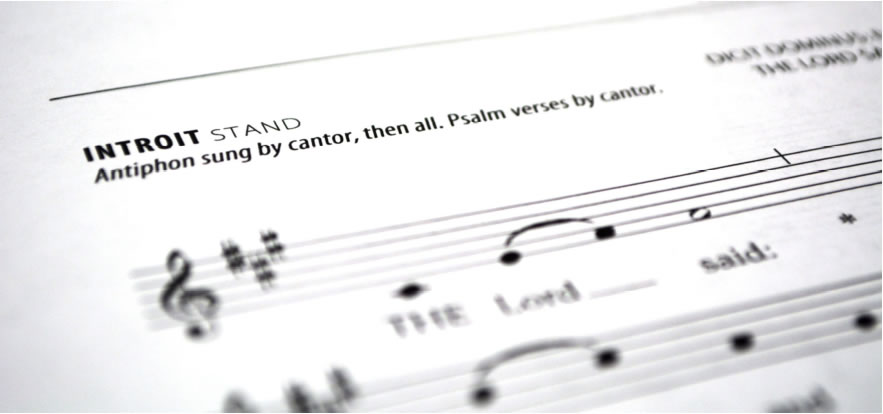
Why Antiphonal Chant in the Mass?
by Fr. Will Schmid | 11/26/2016 | Weekly ReflectionEvery Sunday as the priest, deacon, and servers process down the main aisle toward the sanctuary, the music of the Mass begins with the chanting of an antiphon, first sung by a cantor and then by the choir and entire community. After the singing of the antiphon, a psalm, or a portion of a psalm, is sung in conjunction with the antiphon. This process of a sung antiphon/ psalm is then repeated at different moments throughout the Mass. The particular antiphons and psalms that we use each week are given to us by the Church and are known as the "propers" of the Mass - meaning they are the proper chants chosen by the Church for that particular Liturgy.
In addition, the General Instruction of the Roman Missal often indicates that it is most appropriate for the priest to intone particular prayers of the Mass that the entire community will pray together following the priest's intonation. The Gloria, Creed, and Our Father are a few examples of prayers led by priestly intonation. Like the chanting of the "propers" and their corresponding psalms, this is also a type of antiphonal prayer that we find in the Mass.
Why does antiphonal prayer occur so often in the Mass? Although there are multiple ways of answering this question, one of the most satisfying answers is the example of Jesus praying antiphonally from the Cross, making antiphonal chant and prayer most appropriate for the Sacred Liturgy.
According to both Matthew and Mark's Gospels, while on the Cross, Jesus proclaims the opening line of Psalm 22,
"My God, My God, why have you forsaken me?"
In Mark's version of the dying words of Jesus (Mark 15:34), Jesus proclaims the opening line of the psalm using a northern Galilean dialect of Aramaic, " Eloi, Eloi, lama sabachthani?" Mark's use of this particular dialect is significant. First century Jewish children learned to pray the psalms from their mother in the dialect of their local region. In Jesus' case, he would have learned to pray the psalms from His Blessed Mother in the dialect of northern Galilee. When the Jews gathered together to pray the psalms, a cantor would pray the opening line of the psalm and then the entire community would join in the recitation or singing of the entire psalm from memory. The cantor's role was to lead the congregation into prayer of the appropriate psalm. Contrary to popular belief, Jesus is not offering a cry of despair that God has abandoned him. Rather, Jesus is acting as a cantor leading those present into customary antiphonal Jewish psalm prayer, demonstrating that his self-offering on the Cross is a fulfillment of the entirety of Psalm 22.**
Although the desire to enter into prayerful dialogue with God the Father is a desire on every man's heart, because of the damage done to man by sin, man no longer knows how to properly act on this desire by his own efforts. In other words, man does not know how to pray as he ought. Prayer, and ultimately worship, is something we must learn from our Divine Teacher. antiphonal Jewish psalm prayer, God must show us how to worship Him. The Cross, the self-offering of the Son of God, is the example par excellance, of proper worship. Jesus exemplifies what it means to offer perfect worship to God the Father from the Cross. Since the Mass is the Sacramental representation of the Cross of Christ, we must always turn to the Cross as the source of how we are to offer proper worship to God the Father in the Mass. In fact, the worship we offer at Mass is not really our own. Rather, it is the Son's worship of the Father. In the Mass Jesus gives us a mystical entryway into His own worship of the Father. Our worship is authentic worship only insofar as it is connected to and flows from the Eucharist as the source and summit of our faith.
Thus, whenever we use antiphonal chant in the Mass, we imitate the prayer of Christ from the Cross, which reveals an indispensable aspect of our discipleship: our heartfelt desire to worship as Christ worshiped. Consequently, there is a great liturgical dignity attributed to the role of the cantor and all who assist (priests, deacons, and laity) in leading the people of God into the Son's musical worship of the Father.
**For a fuller explanation of Jesus praying Psalm 22 from the Cross, see Part IV of Chapter 3 from Robert Spitzer, S.J.'s God So Loved the World (Ignatius Press, 2016).
BACK TO LIST BACK